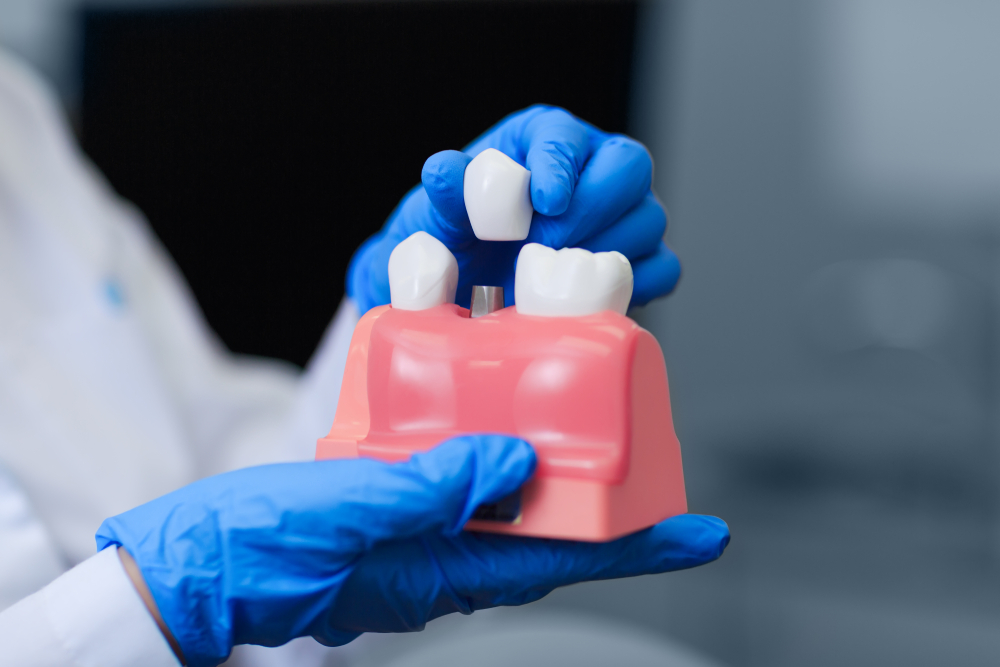Ontario, Canada Of Dental Implants Cost
Implants are a recent revolutionary invention of dentistry. For many people it is a safe, secure and comfortable way to replace missing teeth or to secure dentures.
At Vibrant Square Dental we start the process of installing an implant with a consultation with the doctor. Your health, more than age, is a factor that will determine if you are a good candidate for a dental implant.

How are dental implants installed?
Dental implants consist of two parts: a titanium post that gets secured into your jawbone and a crown – the actual artificial tooth that is placed on top of the post. The crown will be in the shape and color of the missing tooth. In many situations, the titanium post for the implant needs time (sometimes a few months) to heel within the jawbone before the crown is placed on it.
Are Dental implants Covered By Insurance In Canada
Implantation of the teeth of the upper and lower jaws today is considered one of the most popular and modern technologies for the restoration of teeth. The procedure is safe and painless, and its result will allow you for many years to get rid of dental problems such as discomfort when chewing food, changing bite, violation of the aesthetics of the dentition, atrophy of bone tissue and many others.
Dental implantation is one of the leading areas in the work of the NovaDent dental network. Our implantologists are highly qualified doctors, participants in international forums and winners of prestigious awards in the field of dentistry. Each of our specialists has passed special training and owns the latest implantation techniques, so you can safely entrust us with the health and beauty of your smile.
Dental implant restoration:
Implant restoration involves surgically anchoring implants into the jawbone below the gum line, then attaching an artificial tooth to those implants. After the implant has been placed, your gum and bone will continue to grow around it, ensuring that the implant stays firmly in place.
Discussing insurance coverage for Dental Implants is a bit complex. Most insurance plans won’t cover dental implants. Coverage for dental implants depends on the insurance company and the plan. In Canada, everyone looks for coverage if they are considering dental services. Coverage will reduce the cost of dental cleanings, regular check-ups, restoration, and any extensive dental procedures such as a dental implant. Financial coverage is essential whenever you visit the dentist. At present, within the government healthcare system in Canada, routine dental care will not be covered. Some provinces require payment for medical dental procedures that are performed in the hospital. For example, there is no coverage for:
- Cavity fillings
- Routine dental check-ups
- Restorative dental care and preventive care
- Dentures
- Dental implants
- Bridges, crowns, veneers, and in-lays
- X-rays
- Orthodontic procedures
Private health benefit providers offer supplemental dental plans. Purchasing one of these plans is essential if:
- freelance, contract, or self-employed
- an employer-based health plan does not exist
- retiring without any group health coverage at work
It’s important to understand what dental implants are before getting them. An implant is a frame or metal post that is surgically positioned into a jawbone beneath the gum line. At this stage, the dentist can mount any replacement teeth onto the implant. The implant is fused to the jawbone and will give support for any artificial teeth. In the case of a bridge or denture, it will be firmly secured and no longer shift or slip in the mouth. Speaking and eating properly will be more natural. The dentist will explain the difference in the dental implants and describe the procedures before they take place. The dentist will need to do a thorough examination of a mouth to determine whether or not a dental implant is possible. In some cases, certain procedures do not fit the candidate.
Full Dental Implant Cost Canada
Many Canadians have a dental plan through an employer, union or the provincial government. There are still some plans in Canada that consider dental implants elective procedures rather than necessary ones. The cost of a dental implant solely depends on the insurance dental plan. Here is a fact sheet that offers a guide for planning personal payments. Be aware that a dental plan and a treatment plan are two different things:
- A dental plan is a means of paying for your dental treatment. Employers provide dental benefits for a variety of reasons, including the promotion of good health.
- A treatment plan is the personal plan that the dentist and client develop together to meet oral health needs. This plan is about maintaining good oral health into the future. It should not be limited by what a dental plan will cover.
If a dental plan already exists: Read the booklet or other materials available from the provider. Oral health care is a personal responsibility. Be fully knowledgeable of what the plan provides and how it works. Important helpful questions to answer while planning for oral care:
- What is covered each year?
- Is there a deductible?
- Is there a total dollar limit on this coverage plan?
- Are other procedures available in addition to what the given plan covers?
- Does this plan coverage remain if there is a job change?
- To what extent does coverage include cleanings and x-rays?
- To what extent does coverage include dental treatments such as fillings and root canals?
- What about other treatments such as bridges and crowns, dentures and oral surgery?
- Can any dentist be chosen? (Some plans restrict the client to a list of approved dentists.)
A co-payment is the part of the bill where no reimbursed is available. Be clear about what the plan covers and the extent of the coverage. Dentists can assist in claiming benefits. As mentioned earlier, a dental plan should never dictate a treatment plan. Dentists can help estimate how much will be covered before moving ahead. They can submit a pre-treatment plan to an existing dental plan administrator for a predetermination of benefits. This is not a guarantee, but it does reduce the chances of a personal claim for reimbursement being limited or declined. Remember that a dentist is treating the client, not the dental plan.






